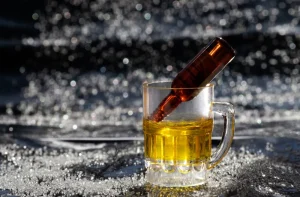
When eating out, they should make a point of asking about ingredients to make sure they do not contain alcohol, because even a small amount can cause a reaction. However, only two of the 68 participants have a medically diagnosed allergy. This figure represents people whose symptoms are traceable to what the manufacturers made the product from and its production process, not the alcohol itself. Just as grapes can become wine, table fruit that becomes too ripe might contain enough alcohol to cause a reaction in someone with an alcohol allergy. While organic wines cannot add sulfites to their products by law, some contain enough natural sulfites to trigger a reaction in sensitive people.
- The medication is injected to quickly relax muscles to open up airways.
- This article discusses allergies to alcohol, symptoms, triggers, tests, and treatment options.
- Alcohol allergies are rare, but if you do have one, it doesn’t take much to trigger a reaction.
- Sulfites are preservatives, and most countries permit their addition to alcoholic drinks such as beer and wine.
- Yeast is used in all fermented alcoholic beverages, including beer, wine, hard cider, and sake.
Other Symptoms
- If you’re taking medication, check with your doctor to see if it’s OK to drink alcohol while you take it.
- “This is known as food-dependant cofactor induced anaphylaxis,” Dr Watts says.
- Rarely, severe pain after drinking alcohol is a sign of a more serious disorder, such as Hodgkin’s lymphoma.
- Your body has two enzymes that are supposed to break down histamine, but sometimes they don’t work as well as they should.
- While beer can contain histamines, certain types like low-alcohol beer may have lower histamine levels compared to other varieties.
Having an allergy to alcohol itself is very rare, but it is fairly common for people who have other allergies or asthma to see an increase in their symptoms when they drink alcoholic beverages. Those who notice an increase in their asthma symptoms after drinking alcoholic beverages, especially wine, might be reacting to potassium metabisulfite, a common preservative. “Development of hives or red bumps are commonly due to a reaction to histamines that can’t be broken down,” says Dr. Glatter. It’s the inability to metabolize these histamines that can cause an allergic reaction or flare-up, he says. Levels of histamines vary based on alcohol, but they will be in higher concentrations in beer and wine (especially red), he says.

What to expect from your doctor

Unfortunately, nothing can prevent reactions to alcohol or ingredients in alcoholic beverages. To avoid a reaction, avoid alcohol or the particular substance that causes your reaction. Symptoms of an alcohol allergy can be similar to those of other conditions such as food allergies, alcohol intolerance, or even conditions like rosacea, which can cause facial flushing.

Avoid alcohol if you have an allergy to grains or other foods.
- If you drink a beverage that causes a mild reaction, over-the-counter antihistamines might help relieve symptoms.
- However, some people develop allergy-like symptoms, such as an itchy throat and nasal congestion, in response to the sulfites in wine.
- Symptoms of alcohol intolerance can make a person feel uncomfortable.
People with this condition usually experience swelling in the lymph nodes in areas including the neck, armpits, or groin. The immune system overreacts to this allergic reaction to rum exposure in the body, treating alcohol as a threat. The body produces antibodies, and when they encounter alcohol, they set off a systemic allergic reaction.

Your healthcare provider will ask you about the symptoms and reactions that occur after you drink alcohol. In people with alcohol intolerance, a genetic mutation (change) makes ALDH2 less active or inactive. As a result, your body can’t convert acetaldehyde to acetic acid. Acetaldehyde starts to build up in your blood and tissues, causing symptoms. Our bodies are full of enzymes, proteins that help break down food. Alcohol intolerance is a problem with the specific enzyme that helps your body metabolize alcohol.
Alcohol Intolerance

Learn the signs and symptoms to keep an eye out for and why certain drinks might affect you more than others. Although not a true allergy, in some cases, what seems to be alcohol intolerance might be your reaction to something in an alcoholic beverage — such as chemicals, grains or preservatives. Combining alcohol with certain medications also can cause reactions. These tests help determine whether your symptoms are due to an alcohol allergy, alcohol intolerance, or another underlying condition.
Is there a cure for alcohol intolerance?
Allergy symptoms that alcohol makes worse
What are the symptoms of alcohol allergy?